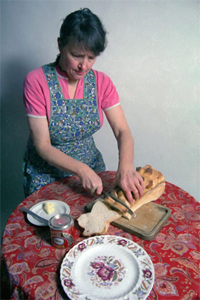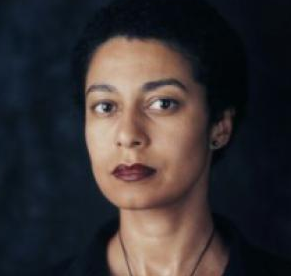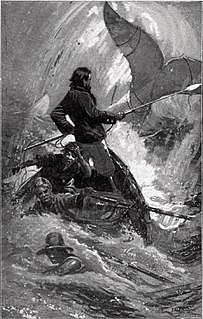The Seafarer is an Old English poem giving a first-person account of a man alone on the sea. The poem consists of 124 lines, followed by the single word "Amen". It is recorded only at folios 81 verso - 83 recto of the tenth-century Exeter Book, one of the four surviving manuscripts of Old English poetry. It has most often, though not always, been categorised as an elegy, a poetic genre commonly assigned to a particular group of Old English poems that reflect on spiritual and earthly melancholy.

Jo Spence was a British photographer, a writer, cultural worker, and a photo therapist. She began her career in the field of commercial photography but soon started her own agency which specialised in family portraits, and wedding photos. In the 1970s, she refocused her work towards documentary photography, adopting a politicized approach to her art form, with socialist and feminist themes revisited throughout her career. Self-portraits about her own fight with breast cancer, depicting various stages of her breast cancer to subvert the notion of an idealized female form, inspired projects in 'photo therapy', a means of using the medium to work on psychological health.

Linda Nochlin was an American art historian, Lila Acheson Wallace Professor Emerita of Modern Art at New York University Institute of Fine Arts, and writer. As a prominent feminist art historian, she became well known for her pioneering 1971 article "Why Have There Been No Great Women Artists?" published by ARTnews.

Griselda Frances Sinclair Pollock is an art historian and cultural analyst of international, postcolonial feminist studies in visual arts and visual culture. Since 1977, Pollock has been an influential scholar of modern art, avant-garde art, postmodern art, and contemporary art. She is a major influence in feminist theory, feminist art history, and gender studies. She is renowned for her innovative feminist approaches to art history which aim to deconstruct the lack of appreciation and importance of women in art as other than objects for the male gaze.
Beverley Skeggs is a British sociologist, noted as one of the foremost feminist sociologists in the world. Currently, she works as a "Distinguished Professor" in the Sociology Department at Lancaster University, developing a Centre for Social Inequalities in the North West of England. She continues to run the "Economics of Care" theme at the International Inequalities centre at the London School of Economics (LSE) and is a visiting professor at Goldsmiths University. She has been the head of two of the UK’s leading Sociology Departments, at the University of Manchester and Goldsmiths, as well as co-director of Lancaster's Women's Studies. In addition, she played a key part in transforming Britain's oldest sociology journal, The Sociological Review, into an independent foundation devoted to opening up critical social science and supporting social scientists.
Lisa Norling is a U.S. historian noted for her pioneering work on gender and the sea. As such she is part of a new move in maritime historiography to examine gender, race and class in relation to seafaring labor, passengers and people in port cities.

Sara Ahmed is a British-Australian writer and scholar whose area of study includes the intersection of feminist theory, lesbian feminism, queer theory, critical race theory and postcolonialism.
Vron Ware is a British academic and visiting professor at the Gender Institute of the London School of Economics and Political Science. She was previously a Professor at Kingston University editor of Searchlight magazine from 1981 to 1983, and worked as a freelance journalist until 1987 when she co-founded the Women's Design Service. She taught cultural geography at the University of Greenwich from 1992 to 1999, sociology and gender studies at Yale University from 1999 to 2005, and was senior research fellow at the Centre for Research on Socio-Cultural Change at the Open University from 2008 to 2014.
Lubaina Himid is a British artist and curator. She is a professor of contemporary art at the University of Central Lancashire. Her art focuses on themes of cultural history and reclaiming identities.
Sarah Wigglesworth MBE RDI is a British award-winning architect and was a Professor of Architecture at the University of Sheffield until 2016.

Maud Sulter was a Scottish contemporary fine artist, photographer, writer, educator, feminist, cultural historian, and curator of Ghanaian heritage. She first worked as a writer and poet, later turning to the visual arts. Sulter was known for her collaborations with other Black feminist scholars and activists, capturing the lives of Black people in Europe. She was a champion of the forgotten African-American sculptor Edmonia Lewis.
Oreet Ashery is an Israeli interdisciplinary artist based in London.

Nautical fiction, frequently also naval fiction, sea fiction, naval adventure fiction or maritime fiction, is a genre of literature with a setting on or near the sea, that focuses on the human relationship to the sea and sea voyages and highlights nautical culture in these environments. The settings of nautical fiction vary greatly, including merchant ships, liners, naval ships, fishing vessels, life boats, etc., along with sea ports and fishing villages. When describing nautical fiction, scholars most frequently refer to novels, novellas, and short stories, sometimes under the name of sea novels or sea stories. These works are sometimes adapted for the theatre, film and television.

Kim Sawchuk is a professor in the Department of Communication Studies, Research Chair in Mobile Media Studies, and Associate Dean of Research and Graduate Studies at Concordia University in Montreal Canada. A feminist media studies scholar, Sawchuk's research spans the fields of art, gender, and culture, examining the intersection of technology into peoples lives and how that changes as one ages.
Rachael House is a British multi-disciplinary artist, based in London and Whitstable.
Heidi Safia Mirza is a British academic, who is Professor of Race, Faith and Culture at Goldsmiths, University of London, Professor Emerita in Equalities Studies at the UCL Institute of Education, and Visiting Professor in Social Policy at the London School of Economics (LSE). She has done pioneering research on race, gender and identity in education, multiculturalism, Islamophobia and gendered violence, and was one of the first black women professors in Britain. She is author and editor of several notable books, including Young, Female and Black (1992), Black British Feminism (1997), Tackling the Roots of Racism: Lessons for Success (2005), Race Gender and Educational Desire: Why Black Women Succeed and Fail (2009), Black and Postcolonial Feminisms in New Times (2012), and Respecting Difference: Race, Faith, and Culture for Teacher Educators (2012).
Anne Walmsley is a British-born editor, scholar, critic and author, notable as a specialist in Caribbean art and literature, whose career spans five decades. She is widely recognised for her work as Longman's Caribbean publisher, and for Caribbean books that she authored and edited. Her pioneering school anthology, The Sun's Eye: West Indian Writing for Young Readers (1968), drew on her use of local literary material while teaching in Jamaica. A participant in and chronicler of the Caribbean Artists Movement, Walmsley is also the author of The Caribbean Artists Movement: A Literary and Cultural History, 1966–1971 (1992) and Art in the Caribbean (2010). She lives in London.

Radhika Menon is an Indian female merchant navy officer currently serving as the captain of the Indian Merchant Navy. She is also the first female captain of the Indian Merchant Navy who also leads the oil products tanker Suvarna Swarajya. In 2016, Radhika also became the first woman to receive the IMO Award for Exceptional Bravery at Sea. She is well known for her rescue operation which she conducted successfully in June 2015 saving seven fishermen who were trapped for a week in a boat. she is in the adivosary board of delhi based maritime magazine name Sea and Coast.
Gail Lewis is a British writer, psychotherapist, researcher, and activist. She is Visiting Senior Fellow in the Department of Gender Studies at the London School of Economics, and Reader Emerita of Psychosocial Studies at Birkbeck College. She trained as a psychodynamic psychotherapist at the Tavistock Clinic.
Penelope Summerfield, FBA, FRHistS, FAcSS, commonly known as Penny Summerfield, is an English historian and retired academic.








